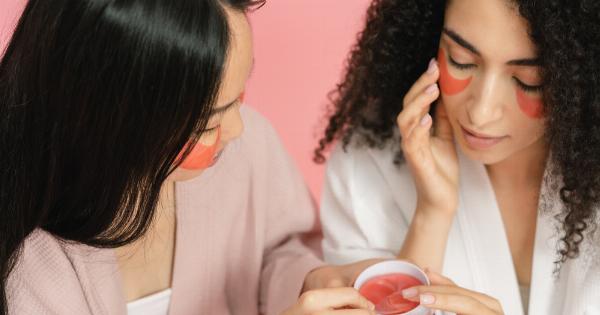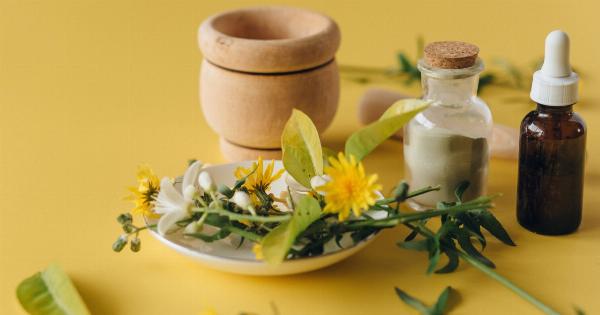Swelling under the eyes, also known as under-eye bags or puffy eyes, can be a bothersome and frustrating issue. This condition can make you look tired and older than you actually are.
However, there are several simple and effective remedies that can help soothe and treat swelling under the eyes. In this article, we will explore these remedies and provide step-by-step instructions on how to use them.
1. Cold Compress
A cold compress is one of the easiest and most effective ways to reduce swelling under the eyes. The cold temperature helps constrict blood vessels, reducing inflammation and puffiness.
– Take a clean washcloth and soak it in cold water. Alternatively, you can also use chilled cucumber slices or cool tea bags.
– Place the cold compress on your closed eyelids for about 10-15 minutes.
– Repeat this process several times a day until the swelling subsides.
2. Cucumber Slices
Cucumbers have natural astringent properties that can help reduce swelling and soothe the delicate skin under the eyes.
– Cut a fresh cucumber into thick slices.
– Place the slices in the refrigerator for 10-15 minutes to chill.
– Place the chilled cucumber slices on your closed eyelids for about 10 minutes.
– Repeat this process twice a day until you notice an improvement in the swelling.
3. Tea Bags
Tea bags, particularly those containing chamomile or green tea, can help reduce swelling and inflammation under the eyes.
– Steep two tea bags in hot water for a few minutes.
– Remove the tea bags from the water and let them cool down.
– Place one tea bag on each closed eyelid and leave them on for about 15 minutes.
– Repeat this process twice a day for best results.
4. Cold Milk
Cold milk can also help soothe and reduce swelling under the eyes. Milk contains proteins, amino acids, and lactic acid, which can help tighten the skin and reduce inflammation.
– Soak a cotton ball in cold milk.
– Gently apply the milk-soaked cotton ball to the area under your eyes.
– Leave it on for about 15 minutes, then rinse off with cold water.
– Repeat this process twice a day until the swelling subsides.
5. Aloe Vera Gel
Aloe vera gel has soothing and anti-inflammatory properties that can help reduce swelling under the eyes. It also moisturizes the skin, making it look fresher and more youthful.
– Extract fresh aloe vera gel from an aloe vera leaf.
– Apply the gel gently to the area under your eyes.
– Leave it on for about 20 minutes, then rinse off with cold water.
– Repeat this process twice a day for optimal results.
6. Potato Slices
Potato slices have astringent properties that can help reduce swelling and puffiness under the eyes.
– Peel and wash a potato.
– Slice the potato into thick slices.
– Lie down and place the potato slices on your closed eyelids for about 10-15 minutes.
– Repeat this process twice a day until the swelling diminishes.
7. Preparation H
Preparation H, a hemorrhoid cream, can also be used to reduce swelling under the eyes. However, make sure to choose the ointment version, as creams may cause irritation.
– Take a small amount of Preparation H ointment on your clean fingertips.
– Gently apply the ointment to the swollen area under your eyes, avoiding contact with the eyes themselves.
– Leave it on for about 10 minutes, then rinse off with cool water.
– Repeat this process once a day, preferably before going to bed.
8. Hydration and Sleep
Ensuring you drink enough water and get adequate sleep can also help reduce swelling under the eyes. Dehydration and lack of sleep can both contribute to puffiness and inflammation.
– Drink at least 8 glasses of water per day to keep your body hydrated.
– Aim for 7-9 hours of quality sleep each night.
– Elevate your head while sleeping by using an additional pillow to prevent fluid from pooling under your eyes.
9. Avoid Salt and Alcohol
High salt intake and alcohol consumption can lead to water retention, which can contribute to swelling under the eyes. It is best to limit your salt intake and reduce alcohol consumption to prevent further puffiness.
10. Allergy Management
If your under-eye swelling is caused by allergies, it is important to manage your allergy symptoms. Consult with a healthcare professional for appropriate allergy medication and try to avoid allergens that trigger your symptoms.





























